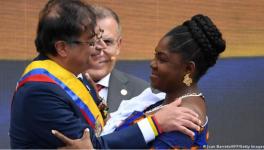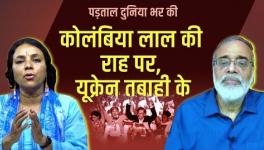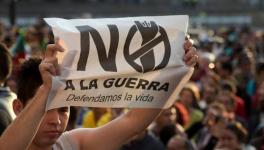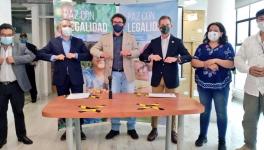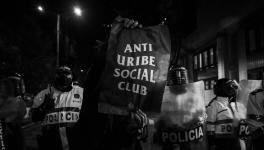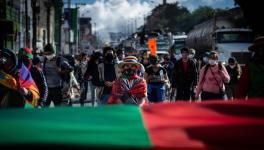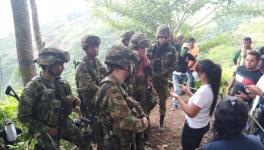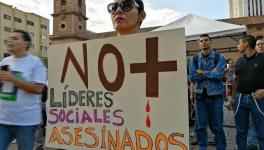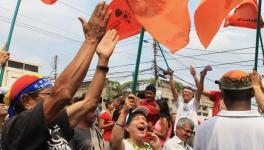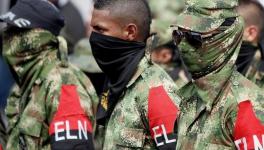Colombia Elections: What Do Candidates Say About Peace?
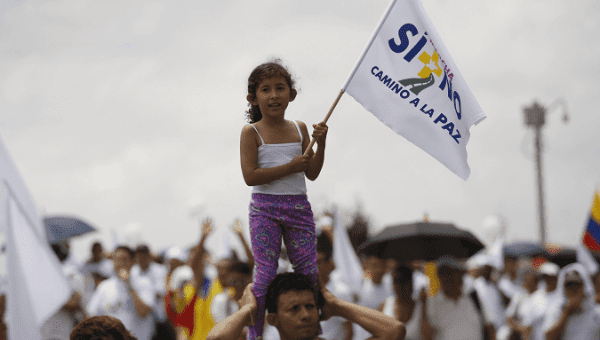
Colombians took to the streets to demand peace with FARC in 2016. | Photo: EFE
Colombians will head to the polls on May 27 to choose their next President, or at least to choose the candidates that will enter the second round of votes, scheduled for June 17. These are the first presidential elections since the Peace Accords between the now extinct Revolutionary Armed Forces of Colombia (FARC) and the Colombian government were signed in 2016.
Given the fragility of the peace accords and the ongoing negotiations with the National Liberation Army (ELN), teleSUR has prepared a profile on the presidential candidates and their stance on Colombia’s peace process.
Sunday’s elections can be interpreted as a second referendum on the future of the peace process. Especially since the two candidates that will most likely make it to the second round have starkly different points of view on peace and the necessary policies to facilitate it.
Ivan Duque, candidate for the Democratic Center party founded by former president Alvaro Uribe, is leading the polls with an estimated support ranging between 34 and 38 percent of likely voters.
Duque is the representative of a social sector unsatisfied with the peace accords signed with FARC. In 2016, he led the campaign to reject the peace accord in a referendum called by President Juan Manuel Santos. The ‘no’ vote won by a very narrow margin.
At the core of his political platform is the “structural modification” of the accord reached in Havana, including banning political participation of former FARC members and reforming the Special Jurisdiction for Peace to impose prison terms on former guerrilla fighters.
On the ELN talks, Duque has conditioned future negotiations on a cease of the group’s attacks against state security forces and acceptance of prison terms.
In an interview Wednesday Duque said “I have never agreed with talking about peace and accepting bullets at the same time because it allows violence to become a mechanism to pressure the state. What credibility can that have?”
On the other hand, Gustavo Petro, former guerrilla fighter for the M-19 and mayor of Bogota, has consistently polled in second with support ranging between 22 and 31 percent. He leads the Humane Colombia movement and embraces the political platform of historical leaders of Colombia’s Liberal Party, including agrarian reform.
Although he has expressed his support for the Peace Accords he has also argued that peace is not only the absence of conflict but knowing how to resolve them. According to Petro an economic and social policy aimed at reducing inequalities in the country is at the center of a sustained peace.
On the ELN dialogue, Petro has said greater trust must be built in order to achieve a definitive ceasefire and end the war. Petro himself was in prison for two years for being part of the M-19. In 1990, when the Colombian government signed a peace accord with the M-19, he immersed himself in political life, becoming a congressman and senator.
Between 1994 and 1996 he fled to Belgium due to death threats in a time when left-wing leaders were being persecuted.
Unlike Duque, Petro has spoken out against paramilitary forces and is at the forefront of the public struggle against links between politicians and paramilitary forces. Also, as senator Petro denounced together with other legislators links between Alvaro Uribe and paramilitarism.
Polling in third place with 15 percent of support among likely voters is former mayor of Medellin and governor of Antioquia Sergio Fajardo, who has argued it is vital to respect the Peace Accords.
“I am in favor of the Peace Accords… and I am highly committed to its implementation,” Fajardo has said on multiple ocassions. Fajardo also has experience in peace efforts. As mayor of Medellin he led efforts to demobilize 4,500 paramilitaries.
On the ELN he has insisted on the need of a negotiated resolution to the conflict, but has also said that in the absence of negotiations they must be confronted “with all the might of the Public Force.”
Humberto De la Calle of the Liberal Party and government’s chief negotiator of the FARC Peace Accords, has said the accords are fundamental for his security plan, which includes a National Disarmament Plan and a post-conflict security scheme that relies on more state presence in rural Colombia.
De la Calle has also argued that reaching a peace deal with the ELN, now Colombia’s largest armed insurgency, is the only path for a “complete” peace.
German Vargas Lleras, vice president during Santos’ government, has been vocal against FARC dissident groups and proposed a militaristic approach to solving that issue. He has said he would respect the accords signed in Havana, but at the time of negotiations he opposed the Special Jurisdiction for Peace.
On the ELN he has said he would leave the negotiation table accusing the ELN of gaining territorial control while negotiating with the government.
Lastly, Jorge Antonio Trujillo, evangelical pastor and candidate for the We Are All Colombia movement, has said little about the peace process. So far he has only affirmed he will be “tougher” with FARC.
The last three candidates have less than 10 percent of support according to national polls.
Get the latest reports & analysis with people's perspective on Protests, movements & deep analytical videos, discussions of the current affairs in your Telegram app. Subscribe to NewsClick's Telegram channel & get Real-Time updates on stories, as they get published on our website.









